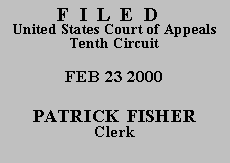

| THURMAN HARRISON, JR., | No. 99-1442
(D.C. No. 99-Z-1382) (D. Colo.) |
On October 22, 1999, Harrison filed an application for a certificate of appealability and a motion to proceed In Forma Pauperis on appeal with this court. Harrison asserts the same two due process violations considered and rejected by the district court. He argued (1) that the Due Process Clause of the United States Constitution prohibits imprisoning a person for debt, and (2) that the imposition of a three-year period of mandatory parole violated a six-year sentencing stipulation of the plea agreement by increasing the period of time he will be in the custody of the department of corrections, thus violating his due process rights.
Harrison failed to raise these two claims as federal constitutional claims in either a direct appeal or on post-conviction review before the state court. Harrison attempted to assert these claims in a second post-conviction application in state court that was denied as successive pursuant to Rule 35(c) of the Colorado Rules of Criminal Procedure. Harrison's claims are therefore procedurally barred. A federal court may proceed to the merits of a procedurally defaulted claim if the petitioner establishes cause and prejudice or a fundamental miscarriage of justice. See Demarest v. Price, 130 F.3d 922, 941-42 (10th Cir. 1997). After careful review of the record, construing his pro se pleadings liberally, see Haines v. Kerner, 404 U.S. 519, 520-21 (1972), we have determined that Harrison has failed to meet his burden. Accordingly, we DENY Harrison's application for a certificate of appealability. Moreover, because we find that Harrison's appeal is frivolous and fails to present a substantial question, we DENY his motion to proceed In Forma Pauperis.
The mandate shall issue forthwith.
ENTERED FOR THE COURT
David M. Ebel
Circuit Judge
*. After examining appellant's brief and the appellate record, this panel has determined unanimously that oral argument would not materially assist the determination of this appeal. See Fed. R. App. P. 34(a)(2) and 10th Cir. R. 34.1(G). The case is therefore ordered submitted without oral argument. This Order and Judgment is not binding precedent, except under the doctrines of law of the case, res judicata, and collateral estoppel. The court generally disfavors the citation of orders and judgments; nevertheless, an order and judgment may be cited under the terms and conditions of 10th Cir. R. 36.3.